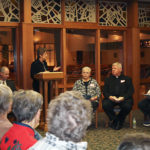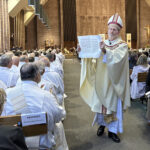
Colleen Darland, administrative assistant for the diocesan Office of Vocations, takes a stroll with husband Danny Darland after their wedding at St. Joseph Parish-DeWitt this summer. This week’s Marriage and Family Series story focuses on Catholic marriage prep.
Many Catholics think that “vocation” refers to someone becoming a priest or a nun… well, that’s only partly true. “Vocation” means more than that, and I believe that it is important for all Catholics, especially young Catholics, to know that there is a whole list of options available to them on how to live their lives according to God’s will. If you don’t know it’s on the menu, then how can you ask for it, right?
One approach that I like to take in order to understand the meaning of a word is to look at its root word. In the case of the word “vocation”, its root word is the Latin “vocare”, which means “to call”. Other English words that have the same origin are “vocal” and “vocabulary”. So I like to imagine that a vocation is when God is being vocal (that is, He is calling someone), and the vocabulary that He uses includes the words that allow one to discover the way to holiness in the manner that God had intended for that person. All the baptized have a universal vocation to be perfect in love for God and neighbor. How this unfolds in one’s life is revealed through one’s primary vocation.
Discernment is the process of knowing which vocation one is called to through prayer and thought. Discernment entails a serious reflection upon one’s self as a beloved child of God in relation to the Creator. It means knowing one’s gifts and talents, abilities and strengths, weaknesses and flaws, disabilities and challenges, and integrating them to be able to use them to live one’s life according to God’s will.
God’s call is how He reveals to us how He wants us to dedicate our body and soul to Him. However, God can’t be heard especially if one is surrounded by so much noise, or distracted by thoughts and things around them. In order to hear God’s call, one must be immersed in a certain silence not only of the ears, but also of the heart, so that one can focus on the source of the call to receive generously the message God has for them.
So, what’s on the menu? The following are the states of life by which we live out the call to holiness:
- Matrimony – Most (not all!) men and women are called to become holy by being married to their spouse. It is important to discern if one is called to marriage. It is easy to think that the only way you can be happy is if you live out the dream of walking down the aisle with someone you love. For some this is true, but for others, this may not be so. The decision to enter into a life-long commitment to be with someone “in good times and in bad, in sickness and in health” needs to be taken very seriously, and not done simply based on feelings.
- Single Life – God calls some men and women to generously share themselves to other persons without getting married. Such persons may not be united to one person exclusively, but they still experience profound love through meaningful, chaste relationships.
- Holy Orders – God calls a few men to take on the image of Jesus Christ as spiritual husband and father to His church. Deacons, priests, and bishops are ordained so that they can minister to God’s people by celebrating the Sacraments and satisfying the needs of the souls under their care.
- Consecrated Life – Some men and women are called to become monks, nuns, and religious brothers and sisters. They take on vows of poverty, chastity, and obedience so that they can be free to give themselves completely to God and His people. They usually live in community and participate in a ministry specific to an order; for example, teaching, taking care of the elderly and sick, manual labor, and many more.
The response to God’s call doesn’t always happen at the same time for all people. Some realize their vocational call relatively early in life (late high school or college age), while others do so a bit later (young adult), and others not until they have had some significant life experiences (middle age). God’s call also indicates where one is to live out one’s vocation. You might have heard of couples from a big city in the East Coast settling in a small town in Iowa and enjoying it there, or missionary priests who serve in remote islands in the Pacific (it still happens!)
Don’t worry if you’re not yet 100% sure what God is asking you to do for the rest of your life. Honestly, nobody can truly be 100% sure. Allow a little room for doubt, and let faith and trust fill in those spaces! Persevere in prayer and continue to deepen your relationship with God so that you can slowly channel your will to be docile to God’s plan for you. A good way to know that you are moving in the right direction is if there is a sense of peace in your life as regards the decisions you are making. It is also helpful to be receiving the Sacraments regularly, especially the Eucharist and Reconciliation, and practice the virtues such as prudence, temperance, chastity, justice, and fortitude. Also, the feedback of others is helpful – family, friends, and trusted adults such as priests, teachers, and coaches can share their thoughts about how they see you using your life to give honor to God.











